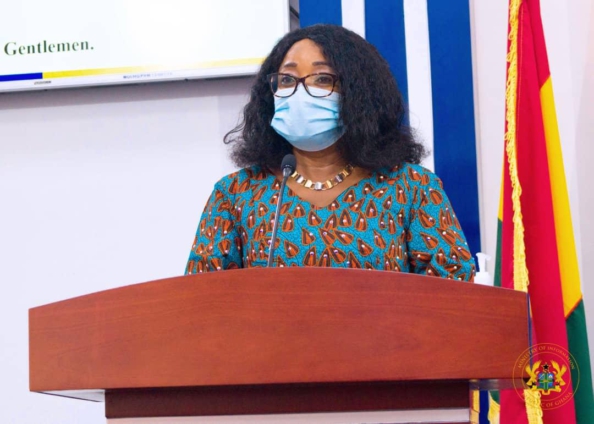
Audio By Carbonatix
The Ministry of Gender, Children and Social Protection has announced an electronic payment platform for beneficiaries on the Livelihood Empowerment Against Poverty (LEAP).
Addressing journalists at the Information Ministry during the “MEET THE PRESS” series on Wednesday, September 2, 2020, the sector Minister, Hon. Cynthia Mamle Morrison stated that all LEAP households have been connected to financial services through the e-payment (Ezwich) platform.
“Five (5) cycles of LEAP cash grants have been paid to 334,084 households to help smoothen their daily consumption. A total of 1,451,656 extremely poor beneficiaries are currently on the LEAP register.
Other achievements chalked under the LEAP include; development of an emergency payment strategy for LEAP in the wake of COVID 19 pandemic, regular engagements with district Social Welfare officers, participating financial Institutions and GHIPSS to discuss and provide solutions to electronic payment challenges.”
According to the minister, 73% of LEAP beneficiaries have been signed unto the National Health Insurance Scheme with 5,522 individuals linked to other complementary and productive activities.
She gave the breakdown is as follows; Labor Intensive Public Works- 3,054, Japanese Social Development Fund -1,235, Village Savings and Loans Association -348 and Complimentary Income Generating Scheme -537.
Touching on data collection, Hon. Morrison also mentioned that the Ghana National Household Registry has been instituted to collect data on the vulnerable in Ghana and become the centre of targeting for social interventions programmes including the Livelihood Empowerment Against Poverty (LEAP), LIPW, NHIS among others.
This data, according to her is useful for planning by the various Metropolitan, Municipal and District Assemblies (MMDAs), Academia, Non-Governmental Organizations (NGOs), Civil Society Groups and other agencies in social development.
The objective of the GNHR database is to improve targeting efficiency and effectiveness and make it easier for the government to identify and target the poor and vulnerable for all social protection interventions in Ghana.
“Currently, Upper West and Upper East regions have data on socio-economic status of 137,565 and 184,125 households respectfully. Northern, North East and Savannah have data on the socio-economic status of 140,000 households so far.
The GNHR is currently continuing with data collection in the North East, Northern and Savannah Regions to obtain an updated and more comprehensive database on poor and vulnerable persons in the country”, she emphasized.
Latest Stories
-
Adom FM’s ‘Strictly Highlife’ lights up La Palm with rhythm and nostalgia in unforgettable experience
2 hours -
Around 40 dead in Swiss ski resort bar fire, police say
4 hours -
AFCON 2025: Aubameyang and Nsue make history among oldest goalscorers
5 hours -
Ghana is rising again – Mahama declares
6 hours -
Firefighters subdue blaze at Accra’s Tudu, officials warn of busy fire season ahead
6 hours -
Luv FM’s Family Party In The Park ends in grand style at Rattray park
6 hours -
Mahama targets digital schools, universal healthcare, and food self-sufficiency in 2026
6 hours -
Ghana’s global image boosted by our world-acclaimed reset agenda – Mahama
7 hours -
Full text: Mahama’s New Year message to the nation
7 hours -
The foundation is laid; now we accelerate and expand in 2026 – Mahama
7 hours -
There is no NPP, CPP nor NDC Ghana, only one Ghana – Mahama
7 hours -
Eduwatch praises education financing gains but warns delays, teacher gaps could derail reforms
7 hours -
Kusaal Wikimedians take local language online in 14-day digital campaign
8 hours -
Stop interfering in each other’s roles – Bole-Bamboi MP appeals to traditional rulers for peace
8 hours -
Playback: President Mahama addresses the nation in New Year message
9 hours

